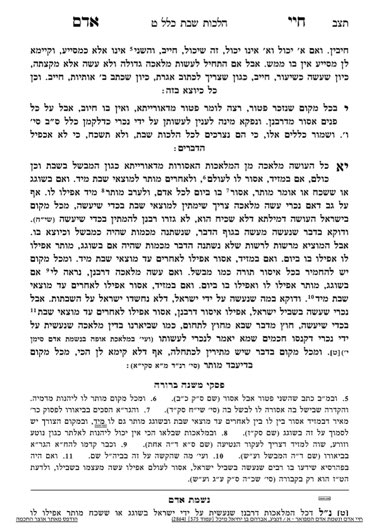Sponsorships for the upcoming Klalim, which discuss the 39 melachos of Shabbos, are available. Please contact Rabbi Reingold for more information at rabbireingold@gmail.com or 301.996.5910
We are continuing in siman 11, discussing the concept of maaseh Shabbos. We left off learning that the Chayei Adam holds the issur of maaseh Shabbos only applies to something which changes the item, and if the item is not changed, the issur does not apply. Thus, when one carries something, the item does not change, so the issur of maaseh Shabbos does not apply. We learned that if one carried it b’shogeig, everyone can benefit from the item immediately. If it was carried b’meizid, everyone can benefit from the item immediately after Shabbos.
Nevertheless, the Chayei Adam writes that it is appropriate to be machmir on issurei deoraysa; meaning, if the maaseh Shabbos came as a result of an issur deoraysa, it is appropriate to be machmir and not to benefit from it. This includes even the case of hotzaah, which does not change the item. The Biur Halacha quotes the Chayei Adam at the beginning of siman 318 sans paskens to be machmir even but hotzaah. To explain, there is a machlokes rishonim about how to learn a Gemara in Eruvin. The Gemara appears to state that there is no issue of maaseh Shabbos on items brought from outside of the techum. One explanation is that the fact it was carried does not effect any change to the item. Other rishonim disagree with this reason and offer alternative explanations. Thus, due to the safeik regarding this idea, the Chayei Adam’s assumption is that one should be machmir. Some of the poskim assume that the fact the Chayei Adam states this halacha in this fashion (first unequivocally stating it is muttar and then suggesting for one to be machmir) indicates that one can rely on the lenient ruling at the time of necessity.
Rav Moshe discusses a case of someone who carried a key of the Shul through a reshus harabbim. Rav Moshe answers that they cannot make use of the key in order to open the doors, and that even if the doors were opened, one would not be allowed to benefit from those doors (i.e., go around or remain outside). Rav Moshe writes that the only solution is to relock the door and then unlock it via a non-Jew.
Rav Shlomo Zalman was also asked about this question. In his teshuvos (Minchas Shlomo), he is machmir. In Shemiras Shabbos Kehilchasa, he is meikil. In the sefer Meoros Shabbos, the author records having asked Rav Shlomo Zalman about this contradiction. Rav Shlomo Zalman responded with a full teshuva in which he writes that he rescinds his psak in Minchas Shlomo, and one should follow the Shmiras Shabbos Kehilchasa that once the melacha was done, the maaseh Shabbos is muttar to all, immediately. Based on our understanding, his point is that once the melacha was done, we are not machmir, because the benefit of the key is indirect.
Reb Moshe’s psak is consistent with the chumra that we said, and Reb Shlomo Zalman’s original psak again does. He was subsequently meikel primarily because it is indirect.
We will discuss the concept of indirect benefit in the upcoming shiur, be’ezras Hashem.
Summary
- If the maaseh Shabbos of a Jew was performed b’shogeig, and it did not create any change in the item, there is no issur to benefit from the item (as opposed to when a change was created in the item, where the person who performed the melacha can not benefit from the item until after Shabbos).
- If the maaseh Shabbos of a Jew was performed b’meizid, and it did not create any change in the item, everyone can benefit from the item immediately after Shabbos (as opposed to when a change was created in the item, where the person who performed the melacha can never benefit from the item).
- Nevertheless, the Chayei Adam states it is preferable in both shogeig and meizid to be machmir and to refrain from using the item until after Shabbos.



